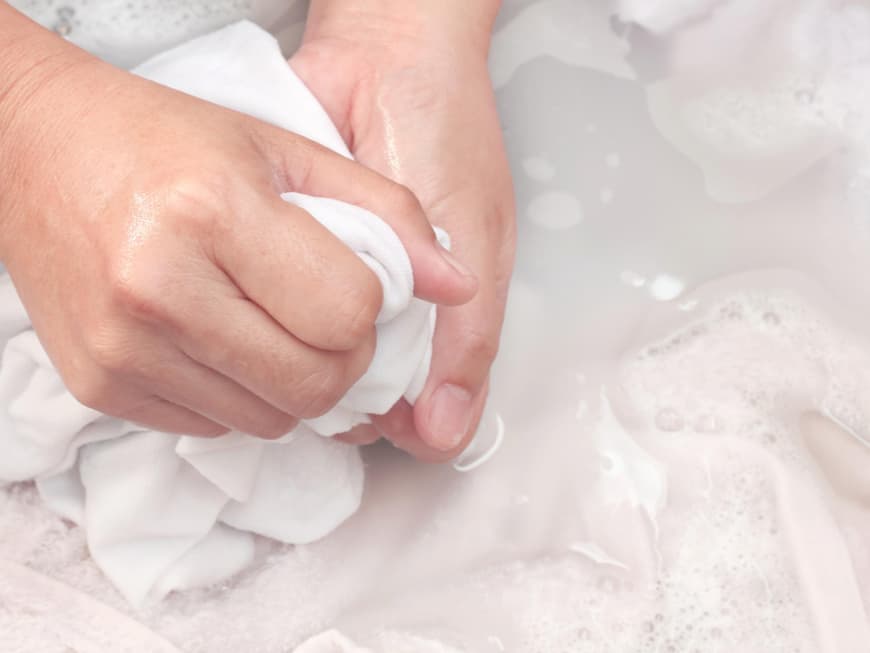
Where does the smell of sweat in clothing come from?
Fresh sweat is initially odorless. It consists mainly of water and a small amount of salt. Other components are urea, amino acids, lactic acid, fats and sugar.¹ Bacteria that live on our skin feed on this mixture. They decompose the sweat and produce waste products in the process. The result is an unpleasant odor.
The microorganisms and their waste products can be easily washed off our skin in the shower. However, they settle in our clothes. A normal wash cycle at temperatures of 30 to 40 degrees Celsius usually does not bother them. However, many materials do not tolerate higher temperatures. Garments that cannot be washed at 60 to 90 degrees Celsius must therefore be pretreated. We will tell you how to remove the smell of sweat from clothing.
Here are four helpful tips to avoid the smell of sweat in your clothes.
Tip 1: Vinegar against the smell of sweat in clothing
Vinegar is a proven all-purpose weapon in the household. It is not only suitable as a cleaning agent, but also for cleaning clothes due to its odor-binding properties. It also has an antibacterial effect, i.e. it kills bacteria. But be careful with white and light-colored clothes - they can be discolored by the vinegar.
This is how it's done:
Pour a glass of light-colored vinegar or vinegar essence into a large bowl or tub and fill halfway with lukewarm water. Soak the smelly laundry in it for about an hour. Then wash in the washing machine as usual.
Tip 2: Remove strong sweat odors with citric acid
Unlike vinegar, citric acid is also suitable for light-colored or white clothing. It also has an antibacterial effect and removes unsightly yellow stains at the same time. Citric acid is only suitable for colored laundry to a limited extent, as it can bleach the colors.
This is how it works:
Add about four spoons of citric acid (for example, as a powder from the supermarket) to one liter of warm water. Stir well and soak the laundry in it for about 1 hour before washing.
Tip 3: Washing soda, baking powder or baking soda
Washing soda is available at the supermarket or drugstore. It reliably removes odors from textiles. Alternatively, you can also use baking soda or baking powder, as these have similar effects to soda and remove perspiration odors.
Instructions:
Mix about 5 liters of water with a tablespoon of soda. Leave the resulting lye to stand for about half an hour and then soak the clothes in it overnight. Wash as usual the next day.
Tip 4: Remove sweat odor from clothing without washing
Not all clothing can be cleaned with the above-mentioned products. Fine textiles, such as blouses or blazers, must be treated more gently. A night in the freezer can help here, for example.
This is how it works:
Place the laundry in a plastic bag and seal it tightly. Leave this bag in the freezer for at least 12 hours. The longer the clothes are frozen, the better. Odor-causing bacteria do not feel comfortable in the cold and die off.
What else can help against bad laundry odors
In addition to these 4 tips, there are other measures that can help combat the smell of perspiration in clothing:
The choice of textiles
Some fabrics smell stronger than others. Synthetic fibers, such as polyester, are particularly susceptible. Their smooth surface transports moisture to the bacteria, which can then multiply more easily. Wool, linen or cotton absorb moisture into the fibers. As a result, these fabrics only start to smell after a long period of time.
Preventing the smell of sweat
To avoid the smell of sweat in your clothes, you should use the right deodorant and pay attention to your diet. Deodorants with alcohol kill bacteria and therefore help reliably against odor, but can irritate the skin. Garlic and onions are healthy, but can cause unpleasant body odor if eaten in excess.
Germs in the washing machine
If the laundry is still not fresh despite all countermeasures, the problem may be due to a germ-laden washing machine.² You should pay attention to this:
- Do not leave freshly washed laundry in the machine for too long, as this is where the bacteria start to decompose
- Bacteria can survive in the machine if temperatures are too low
- Textiles such as towels and tea towels should be washed at 60 or 90 degrees Celsius so that the high temperatures also kill the germs in the machine ³
- Do not use too much detergent, otherwise residues will remain in the drum and hoses, which can also cause odors
Some washing machines already have an integrated cleaning program. If possible, you should run this once a month.
